AFF
AFF Review: 61 Bullets

I grew up in the greater New Orleans area, I have minors in political science and history from LSU ... I even worked in the Louisiana State Capitol for awhile. But it wasn't until I saw 61 Bullets at Austin Film Festival that I heard a viable alternative theory about Huey Long's death. (Sure, I heard speculation, but I gave it as much credence as alternate Kennedy assassination theories.) 61 Bullets not only presents the case for this theory compellingly, but it brings in the personal -- the family of Dr. Carl Weiss, accused of assassinating then-Senator Long.
For those of you who haven't had to learn this for a pop quiz, who haven't poked their fingers in the bulletholes in the State Capitol wall, here's the background: In 1935, former La. Gov. Huey Long was shot in the State Capitol. The story we learned is that Weiss leaped out from behind a pillar and started shooting. Long's bodyguards peppered Weiss's body with 61 bullets (thus the documentary's title), and rushed Long to the hospital, but he died several days later. The rationale generally provided for why Weiss did it is that he was mentally unhinged, and perhaps had a beef with Long over Weiss's father-in-law possibly losing a judgeship.
However, many of Weiss's relatives have never quite accepted this theory, it seems. They believe the political ambitions of the Long family (which indeed are legendary) are a big reason behind the concealment of the facts. For example, a federal investigation of the incident never took place -- everything was handled locally, information is missing, etc. Long's body is buried under so much concrete in the Capitol that an autopsy would be impossible, and his surviving descendants/relatives still believe Weiss assassinated him.
AFF Review: Wild

Cheryl Strayed, author and former Dear Sugar advice-giver, wrote a bestseller based on journal entries she kept as she hiked the Pacific Crest Trail as a young adult in the '90s. Her Wild: From Lost to Found on the Pacific Crest Trail is deeply felt, harsh in its openness about her past drug use and infidelities, and a loving ode to her mother. When I heard Reese Witherspoon would play Strayed in the cinematic adaptation, I was hesitant to get too excited. Then I saw the trailer and started counting the days til the movie's release. The screening at Austin Film Festival was packed, so I wasn't alone in my eagerness to see Wild.
Author/screenwriter Nick Hornby (About a Boy, An Education) adapted Strayed's original work; in the hands of director Jean-Marc Valee (Dallas Buyers Club, The Young Victoria), the author's story is told in a type of stream of consciousness. After a cold open with Witherspoon as Cheryl frustratedly throwing a boot off a mountain, we are shown a truck (driven by the real Strayed) dropping our main character off at a less-than-reputable hotel. Before she starts the journey and throughout her long hike -- which seems as much a penance as a form of self-discovery -- quick edits take the viewer through flashes of her memory. In this non-linear manner, scenes from her childhood, college experience, and young, troubled marriage are interspersed in the timeline of her months-long trek.
AFF Review: The Suicide Theory
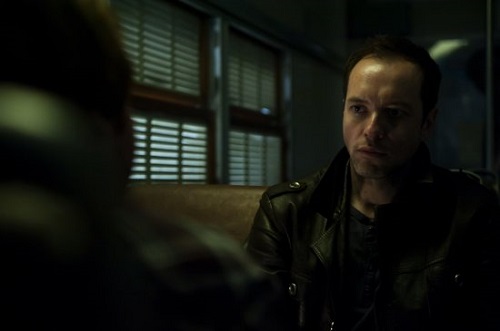 To what length would a desperate and grief-stricken person go to end their life? Several failed attempts at suicide drive Percival (Leon Cain) to hire a professional hitman to kill him in The Suicide Theory, an Australian thriller written by Michael Kospiah and directed by Dru Brown.
To what length would a desperate and grief-stricken person go to end their life? Several failed attempts at suicide drive Percival (Leon Cain) to hire a professional hitman to kill him in The Suicide Theory, an Australian thriller written by Michael Kospiah and directed by Dru Brown.
Steven Ray (Steve Mouzakis) is dealing with his own personal tragedy -- his pregnant wife Annie (Zoe de Plevitz) was killed in a hit-and-run accident while crossing the street. He's developed such a phobia that he is stricken with seizures any time he attempts to step off a street curb, to the extent of taking cabs just to cross the block. The two men meet when Percival literally jumps from a building and lands on a cab that Steven is in, casing his next victim. What appears to be a chance meeting to Steven is fate to Percival, who appears to be delusional. However, as Steven repeatedly attempts yet fails to kill Percival, he begins to believe and even identify with Percival's desperation.
As the story of The Suicide Theory further unfolds, we learn that the tragic bond which brings these two unlikely friends together is much darker and complex than can be imagined. As the pieces of the puzzle are revealed and put in place, I found myself on the edge of my seat and engrossed in the revelations. Just enough comedic writing is woven in to help alleviate nervous tension from the seriousness of this film's main plot.
AFF Review: The History of Time Travel
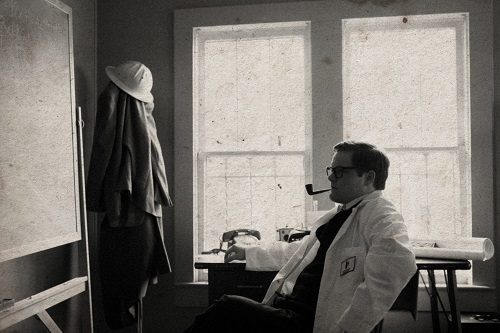
“If you think Hitler with an atomic bomb is bad, imagine Stalin with a time machine.”
As discussed in Austin Film Festival panel "Science Fiction Versus Science Fact," much of fiction is driven by the "What if?" In his feature directorial debut The History of Time Travel, Stephen F. Austin State University student filmmaker Ricky Kennedy takes on the high concept of time travel and the consequences of its use on both personal and world events. Kennedy wrote, directed and edited this fictional documentary, which premiered at AFF.
Filmed entirely on location in Nacogdoches, Texas, The History of Time Travel is presented as a well-constructed docudrama, relating the fictional story of the Indiana Project and the biography of a key contributor, physicist Edward Page (Daniel May). This project is the United States response to reports that Hitler was less interested in nuclear weapons after his scientists began exploring time travel as an ultimate power. Page works long hours for decades, neglecting his wife Anne (Elizabeth Lestina) and son Richard in the hopes of achieving one of man's greatest desires: the ability to travel through time and alter events in one's favor.
AFF Review: The Texas Promise
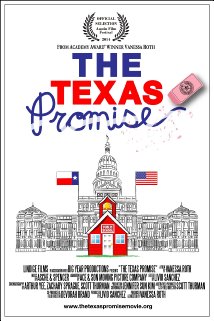 In 2011, the Texas Legislature voted to remove $5.4 billion from the state's education budget. Vanessa Roth's intelligent and informative documentary, The Texas Promise, examines some of the reasons behind this decision as well as various effects it had on Texas public schools.
In 2011, the Texas Legislature voted to remove $5.4 billion from the state's education budget. Vanessa Roth's intelligent and informative documentary, The Texas Promise, examines some of the reasons behind this decision as well as various effects it had on Texas public schools.
The film opens with a series of hopeful young students talking about what they want to be when they grow up, but the narrative quickly moves into the nitty gritty of the matter at hand. Thanks to the people in charge at the governmental level, these students probably have a challenging path ahead of them for reasons that have more to do with money and politics than their own academic skills and goals.
Roth helps to explain the situation by relying on quite a bit of footage captured during the legislative debates leading up to the 2011 decision, and these moments help to provide a summary of the players on either side of the issue (though you may not have realized "funding public schools" could be such a divisive idea). Dan Patrick and Wendy Davis are both featured, making The Texas Promise relevant to this week's elections, also.
Roth also interviews teachers, parents, academics and analysts to provide greater scope, and through the eyes of these individuals it becomes clear how dire the situation is for so many Texans. It isn't just overcrowded classrooms and overworked teachers, it's the misplaced priorities among those who hold power that makes the future seem grim, especially for the non-wealthy.
Throughout the film, Roth does an excellent job of balancing emotion with facts, and she succeeds in illuminating a complex issue without resorting to oversentimentality or oversimplification. It's practically impossible to simplify such a mess, anyway, but it's heartening to see that enough people were outraged enough to protest and ultimately sue the state to try and recover some of the lost funds.
AFF Review: The Sideways Light
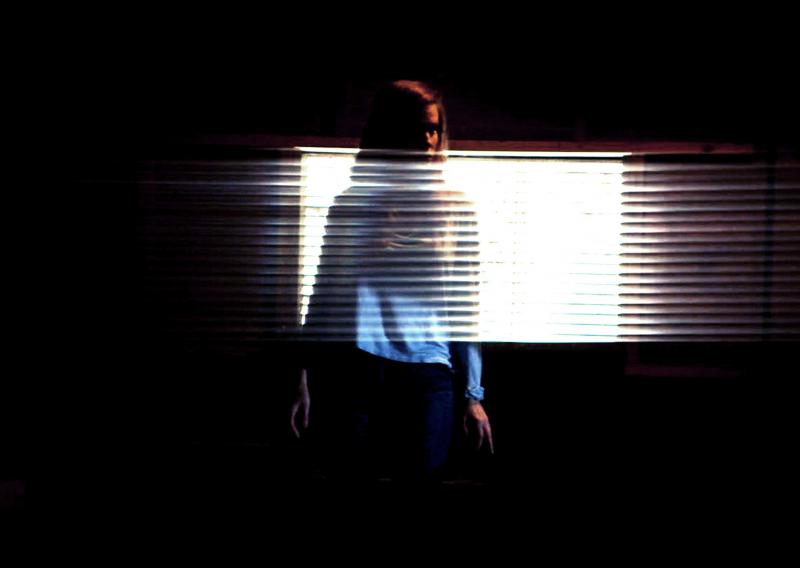
Last Sunday, after a day at Austin Film Festival packed with a lackluster panel, a surprisingly well-done foreign shorts program, and the screening of a Reese Witherspoon film I've been keen to see for months, I closed the evening with The Sideways Light at the Alamo Drafthouse Village. The thriller was a chilling cap to the night.
In her large house, sextuagenarian Ruth (Annalee Jefferies, Ain't Them Bodies Saints, The Girl) putters around and talks to herself (or so we and her daughter assume). Worried about her ailing mother, Lily (Lindsay Burdge, A Teacher, Frances Ha) has moved back home for the interim. Daughter Lily uneasily slips into the role of caretaker as her mom becomes more childlike. She takes breaks offered by her brother Sam (Mark Reeb, Eve of Understanding, Sun Don't Shine) to visit and flirt with bar owner Aidan (Matthew Newton, Queen of the Damned, Farscape).
Ruth has been diagnosed with early-onset Alzheimer's, but that's not all she's dealing with. She hates to leave the house because "they look after me." Lily comes to realize who "they" are as the film progresses.
AFF Review: 21 Years: Richard Linklater
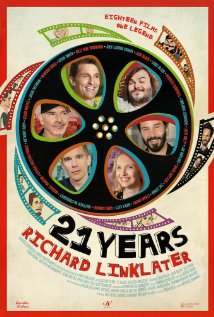
21 Years: Richard Linklater, which had its world premiere at Austin Film Festival on Oct. 24, primarily consists of two types of footage: interviews with charismatic actors who have worked with Richard Linklater, and scenes from the director's films up to and including Before Midnight (Boyhood is mentioned in passing). The result is often enjoyable but limited in scope, and ultimately the film comes off as more of a puff piece than an insightful documentary.
The question underlying 21 Years seems to be, "Why isn't Linklater better known and and as universally well loved as he is in Austin?" It's a good one to ask, but directors Michael Dunaway and Tara Wood don't so much answer that question as compile a series of examples that he is truly respected and admired by actors who have worked with him.
Repeat collaborators like Ethan Hawke, Julie Delpy, Jack Black and Matthew McConaughey seem to have nothing but nice things to say about their pal Rick, and the enthusiasm and awe they exhibit is infectiously positive. From specific stories about filming to broad appreciation of his zen-like demeanor, the talking heads enlisted for this project are clearly happy to sing the praises of Richard Linklater.
Fans of the director and his movies will be helpless to resist the charms of attractive actors telling fun stories, and the sense of an underdog receiving his due makes it easy to be swept along with the pleasant nostalgia of watching clips from Slacker and Dazed and Confused, among other films. The fact that the discussion never goes deeper than surface-level adoration is a little disappointing, though; thoughts from people who have worked extensively with Linklater behind the camera (editors, producers, cinematographers) are nowhere to be found.
Unless you're watching 21 Years as a complete newcomer to the director's work, you won't learn anything about him. Making the film even harder to take seriously are the animated segments accompanying the interviews. Playful and silly, these images cement the fact that this production is all about fun and only tangentially concerned with substance.
AFF Review: Crazy Carl and His Man-Boobs: An Austin Love Story
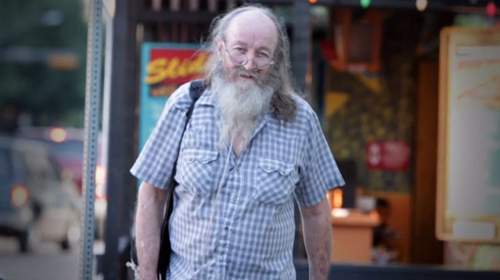
With the influx of transplants, the rise of condos and office buildings across the Austin skyline, and the gentrification of much of Austin's eclectic areas, it can be hard to remember the vibrant time of the past. You could people -watch all day at local cafes including the original Quack's on the Drag -- actually called "Quackenbush’s Intergalactic Dessert Co & Espresso Café" -- and Les Amis, then visit Sixth Street to listen to street musicians and buy a flower from a street vendor without having to step over the remnants of drunkenness.
Beef and Pie Productions filmmakers capture the nostalgia of old Austin in their 50-minute documentary film, Crazy Carl and His Man-Boobs, which premieres at this year's Austin Film Festival and screens again tonight at 7 pm at the Alamo Drafthouse Village. This quirky and entertaining film brings to light the forces that both created and are driving this phenomena away. As the economic and political landscape has changed in Austin, so has the heart and the people of this progressive city.
If you've ever been to Esther's Follies at Sixth Street and Red River, you may have seen Crazy Carl Hickerson. Best known for selling and spinning flowers, he can also be seen flashing his man boobs and dancing. What you may not know is that Hickerson has also been an Austin City Council candidate several times, with a penchant for odd platforms -- some even related to his foot fetish. Hickerson spends much of his time caring for his wife Charlotte Ferris, and the loving couple are a source of amusement with their good-natured tales.
AFF 2014 Dispatch: Advice from Screenwriters
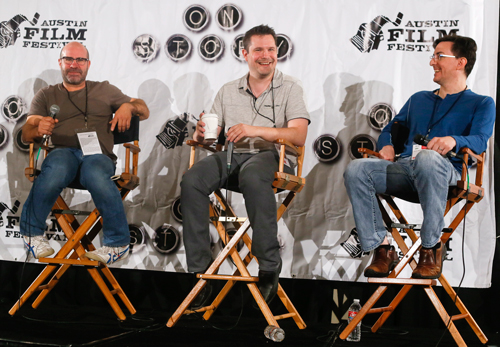 I enjoyed several of this year's panels at Austin Film Festival, with my only complaint being how to choose between concurrent sessions. The quality and diversity of conversations and panels were superb.
I enjoyed several of this year's panels at Austin Film Festival, with my only complaint being how to choose between concurrent sessions. The quality and diversity of conversations and panels were superb.
My highlight was "Science Fiction versus Science Fact" on Friday, when Scott Z. Burns (Side Effects, Contagion), Eric Heisserer (Hours, The Thing) and Ashley Miller (Thor, X-Men: First Class) discussed the fictional future we see onscreen and how they've addressed unknown possibilities in their own screenwriting.
Burns spoke about preparing for Contagion by approaching it as if science fiction movie by asking experts, "Tell me what's possible? What hasn't happened yet?" He emphasized the importance of research first -- "it's a phenomenal procrastination tool, and you can get amazing gems for narrative" -- citing cell phone jammers as an example of how authorities plan to control the flow of information during crisis, which makes for a good dramatic point.
AFF Review: Hardy

Boxer Heather "The Heat" Hardy lives with her parents, sister, nephew and her own young daughter in a working-class Brooklyn neighborhood. She trains with her trainer/boyfriend Devon at the famed Gleason's Gym and dreams of making a full-time career out of fighting and moving out of her current crowded living situation. In the documentary Hardy, from first-time filmmaker (and Austin native) Natasha Verma, the boxer asserts, "I don't wanna get paid like a female, I wanna get paid like a boxer."
The film shows Hardy's path toward signing with a big-time promoter and making more money. In 2012, boxing became the last sport at the Olympics to accept women, and Verma's film displays some aspects of the macho culture still involved in the sport. Posters plugging fights for the male athletes adorn the gym, while Heather is responsible for selling a certain portion of tickets to her bouts. As she waits impatiently before one of her fights, rapper 50 Cent comes into the dressing room full of mostly men and makes disgusting jokes about domestic violence and women who fight back.

